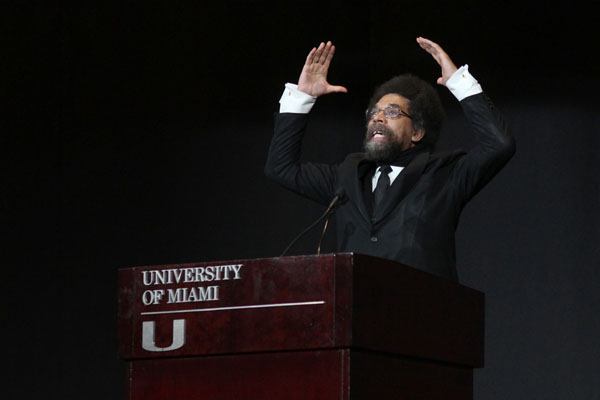

Cornel West spoke to students at the BankUnited Center on Thursday as part of the University of Miami’s celebration of the 50th anniversary of desegregation on campus.
During the event titled “Diversity & Democracy: An Evening with Dr. Cornel West,” the notable intellectual and advocate for social justice spoke to a packed audience of UM students, faculty and staff.
West spoke to the crowd tackling issues of race and society in the United States.
A call for self-realization or “learning how to die” was a major part of West’s message to the crowd.
“The one thing that I took away from it is that he said that we were born to live to die. We are here on this earth to make an impact. I think basically he was saying that we should not be afraid to stand up for what we believe in. We should always be engaging in discussion and not be silent,” junior Kristyn Greco said
The lecture kicked off with an introduction from associate professor Edmund Abaka of the history department who spoke about the 50th anniversary of desegregation at the University of Miami. Following professor Abaka was an introduction of West by President Donna E. Shalala.
University of Miami Board of Trustees made history when in 1961 they made the decision to eliminate a color barrier and admit students regardless of their racial background. Since this effort to admit students “regardless of race, creed or color” the university has made it a priority to have a diverse student population. The University of Miami is reported to have a student body that represents over 90 different countries today alone.
The lecture given by West is part of an effort by the university to celebrate this diversity and the institution’s anniversary of desegregation.
“There was not a negro problem in 1961, there was a catastrophe problem called Jim Crow,” said West in his lecture when talking about the monumental event in civil rights.
In an intimate gathering prior to the lecture, a select group of students, faculty and administrators were able to meet West. Professor Amanullah De Sondy, visiting assistant professor in the department of religious studies, was present at the gathering and talked about why it is important to have a speaker like West come to campus.
“He’s so inspirational and he pushes us out of our comfort zone and has the ability to give us the drive to move forward,” De Sondy said. “I think that drive for me as a professor is important because students need to have that push in their academic life because one’s academic life goes hand in hand with life.”
West made a surprise appearance prior to his lecture at a vigil held by Student’s Towards a New Democracy. The Vigil was being held in solidarity with Black History month and to address issues of inequality that exists for University of Miami’s Chartwells workers. The organization invited West as a guest but had heard no confirmation that he would appear.
Students were surprised when West voluntarily took to the podium to say some words.
“I was told there are some precious, priceless food workers who are not being treated as they ought, let’s salute them,” he said.
West continued to speak about desegregation as he surveyed the crowd.
“It’s a beautiful thing to see people from all different colors and cultures here to fight for justice,” he said. “You can’t talk about desegregation over 50 years ago – of course, by desegregation you’re talking about the vicious legacy of white supremacy – you can’t fight the vicious legacy of white supremacy without also fighting the vicious legacies of male supremacy and the vicious legacies of imperial arrogance and vicious legacies of class exploitation and vicious legacies of homophobia and anti-Semitism and anti-Arab and anti-Muslim and anti-Latino and these racist immigration policies and practices around the nation.”
Senior Ryan Williamson said it was important to him to have West come and speak.
“It’s important to have public intellectuals in our lives,” he said. “Cultural gurus like Cornel West have a message to bring to students. I think his message is one that’s more relevant today than ever.”






